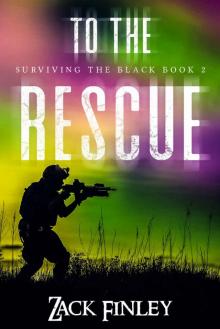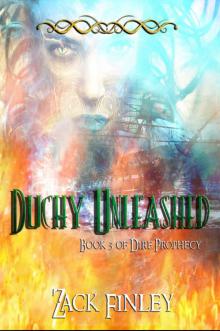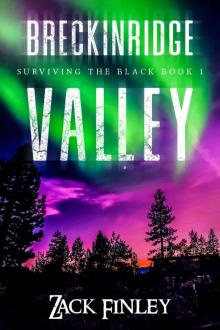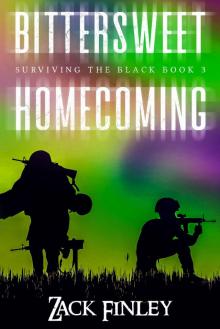- Home
- Zack Finley
Bittersweet Homecoming; Surviving the Black--Book 3 of a Post-Apocalyptical Series
Bittersweet Homecoming; Surviving the Black--Book 3 of a Post-Apocalyptical Series Read online
Bittersweet Homecoming
Surviving the Black--Book 3
By Zeke Finley
Contents
Title Page
Copyright
Author’s Advisory:
Chapter 1
Chapter 2
Chapter 3
Chapter 4
Chapter 5
Chapter 6
Chapter 7
Chapter 8
Chapter 9
Chapter 10
Chapter 11
Chapter 12
Chapter 13
Chapter 14
Chapter 15
Author's note:
Check out my other titles on Amazon:
List of Characters and Places
Copyright 2019 by Zack Finley.
All rights reserved. This is a work of fiction. Names, characters, places, and incidents either are the products of the author's imagination or are used fictitiously. Any resemblance to actual persons, living or dead, is entirely coincidental. While some actual geographic locations are described within, substantial liberties were taken when describing them and their surroundings to advance this story.
◆◆◆
Author’s Advisory:
“Bittersweet Homecoming” is not a standalone novel. It is book three in a five book series. I’ve included some backstory in this book aimed at readers who read “Breckinridge Valley” and “To the Rescue” months ago. I hope it is sufficient to help those wanting to resolve “Where is Andy?” to ease back into the series.
Since even I have trouble at times keeping my characters straight, I’ve included a list of people from Books 1 and 2 at the end of this publication. New this time are links to maps of some significant locations in the series. Much of the action in “Surviving the Black” is constrained by available roads, terrain, and sometimes even businesses. What happens within those constraints is bounded only by my imagination.
◆◆◆
Chapter 1
Where was Andy? After arriving at St. Francis Point after six days of perilous travel through 500 miles of post-apocalyptic America, we found nothing. No Andy and no message.
Six days ago, Andy contacted our base in Breckinridge Valley, Tennessee via HAM radio. Someone attacked Andy's group of more than 20 refugees, including women and children, on their post-apocalyptic journey from Arizona to Breckinridge Valley. The ambush, near Helena, Arkansas, left four dead and two seriously wounded and robbed them of their supplies. With the Helena bridge across the Mississippi River blocked, his group couldn't reach Tennessee much less Breckinridge Valley. Andy radioed home for a rescue.
In a terse radio exchange, we arranged to meet where the St. Francis River joins the Mississippi River, a few miles north of Helena. Andy promised to meet us there or leave a message.
My team of seven warriors and me, Jeremy Breckinridge, fought our way through blocked roads, across Tennessee, and downriver through pirate ambushes to get here. Today's clash with pirates outside of Memphis, Tennessee, wounded Craig, one of my fellow warriors.
To arrive at the rendezvous soonest, Razor, Mike, Ben, and I, left most of our group behind. Our speedy Coast Guard patrol boat allowed us to arrive two hours before our main ride. We came early to prepare Andy’s party for evacuation, so when our main group arrived, they could load up quickly.
When we arrived, nothing indicated Andy was ever here.
Our main party, Allie, Joel, Tom, Craig, and Kurt, a teen we recruited on the trip, were two hours behind us. They brought our much slower moving raft of towboats, the Cumberland and Jersey Girl to join us. With the Cumberland's top speed of 10 miles-per-hour, we expected them to pull in to St. Francis Point by sunset.
We needed the slow-moving boats to transport Andy’s large group back up river in one trip.
With nightfall, the late January temperature would dip back below freezing, putting anyone without warm clothing, heat, or shelter at risk. I imagined Andy's two-year-old daughter cold and hungry. That vision drove my entire team to make the 500-mile journey in only six days.
It was a gut blow to come all this way and find no sign of Andy.
The mouth of the St. Francis River to the north and the Mississippi River to the east formed St. Francis Point. The point was just a spot on the map, a semi-clearing of packed dirt and a long-abandoned fire ring surrounded by the thick forest of trees that choked the area. And lots of litter, beer bottles, glass shards, and a few makeshift benches. The fire ring reeked faintly of urine, but not fire or smoke.
As best I could determine no one visited this clearing since the Coronal Mass Ejection took down the world's electric grid in October. While this might be a place you came to party with your buddies before the crash, it offered none of the essentials to support post-apocalypse life.
The Mississippi River stretched a mile wide at this spot with the St. Francis River tiny in comparison. The location so unremarkable, we almost overshot it on our arrival.
Within minutes we explored the entire point and determined Andy was not here and likely never had been.
Now, the search for Andy must wait until we secured this site for the arrival of the rest of our team.
Ben returned to the patrol boat, while Razor, Mike, and I spread out on foot to check for hostiles. A gravel track, likely used by fishermen or hunters led inland from the trash-filled clearing at St. Francis Point.
Any group preventing Andy from making the rendezvous posed a potential threat to us. We needed to scout the area and determine if we could use this location as a safe base to anchor our search for Andy.
Dense growths of small to medium-sized hardwoods packed the forest around us. The tangled wilderness grew on land deposited by the Mississippi River within my lifetime. This meant every young tree competed vigorously with its neighbors for a place in the sun. This impenetrable jungle felt much different from the hardwood forests of my home around Breckinridge Valley. The ancient sentinel oaks or hickories in my home forests shaded out the competition and stunted the understory. This area lacked those massive trees and the order they provided.
The woodland at St. Francis Point formed part of the St. Francis National Forest, according to our map. The close spacing and low branches of the immature trees combined with gnarly vines, and tree roots made off-the-road travel impossible without a chainsaw or bulldozer. Even with a chainsaw, the downed leaves hid animal burrows, rotted root holes, and other ankle-breaking hazards.
Our team would stick to the roads. Entangled tree limbs at face and chest height made even the game trails too rough to travel for any distance.
At least in late January, cottonmouth moccasins were not a serious hazard, I hoped.
No one, friend or foe, moved very far cross-country in this area. Everyone followed existing roads and tracks, or the rivers, including us.
We followed the track leading away from the point, unsure what we would find, since our only Arkansas map showed no roads in this area.
Ben remained at St. Francis Point with the patrol boat, while the rest of us checked out our immediate surroundings on foot. Ben would come to our aid if called. We reluctantly left him behind, after concluding the sound of his boat engines might attract unwanted attention. The St. Francis River was so narrow we feared its levees would amplify the sounds of the patrol boat. Unlike on the Mississippi River, the engines would have to push upriver against the current.
Razor, Mike, and I prowled along the sides of the access track leading southwest away from the point. The track, I hesitate
d to call something this dilapidated a road, showed no sign of recent use. Its numerous water-filled potholes undisturbed by recent traffic. The track transitioned abruptly into a steep ascent onto a more substantial gravel road on top of a levee. To the left led south toward Helena following the Mississippi River and to the right-angled west along the St. Francis River.
"Intersection, turning right, due west," I radioed.
"Roger," Ben radioed.
Ben, one of the steadiest Rangers on my team, was my defacto second in command. He would take charge of the mission if I went down. When he spoke in his soft Texas drawl, the team listened. Ben could command the situation or slip into the background, depending on what the assignment called for.
Some of my guys functioned at only two speeds, dead stop or all out. Ben could still go all out with the best of us. He always looked for an edge, some way to finesse the situation to deliver the desired outcome. He studied a battlefield like a chessboard, finding tactical advantages others missed, including me.
Ben was spooky quiet in the field, easing through the forest or urban jungle without a sound. He was an ace sniper but deferred to Craig in the field. We all recognized that Craig remained in a class of his own.
Ben stood six feet tall with a medium build. He kept his brown hair cropped short and clipped his beard tight, even in the field. His nondescript hair, brown eyes, and a tanned complexion blended in with most crowds. In a group of strangers, most people overlooked Ben. His Teflon persona helped him excel in all types of recon.
Razor's skills favored urban warfare, not the deep woods. Unlike most of us, he loved the desert. Heat and penetrating dust never bothered him, but he despised the swamps outside Fort Benning, Georgia with a ruthless passion. While most of us detested swamp fighting, Razor took the hatred to a whole different level.
Razor was our ace lockpicker and car thief. His legendary driving skills meant when shit happened, all of us wanted Razor behind the wheel.
His shaggy black hair, Mediterranean features, and bad-boy persona made him a chick magnet. After the power grid went down, Ranger quit shaving, and he now sported a thick bushy beard to go with the mop on his head. He acted unaware of his effect on the ladies.
Razor was one of the shortest men on our team. His wiry build disguised a hidden strength. On one deployment he carried a wounded teammate five miles back to camp without faltering.
No one admitted knowing how he got his nickname. Razor's knife skills were not exceptional, and Buzzer was the man with a pet knife, not Razor. He spoke infrequently, but when Razor talked, I listened. Like many of my team, Razor's life outside of the Army remained a black box.
Mike was a Ranger I never served with in the Army. He served five combat tours in all the regular places. I invited him to Breckinridge Valley based on the recommendation of people I respect. I never doubted his competence or courage. When Zeke proposed Mike for this operation, I hoped it would build the type of rapport I shared with the rest of my team.
Mike came on this outing as our newest backup medic. Tom, our regular medic, remained on the Cumberland tending, Craig, our wounded teammate. Mike started training as a medic after a ricochet injured his leg in a firefight a month ago. Our whole team now spent much of our downtime cross training after the initial shock of the CME wore off.
Mike stood over six-foot tall, of medium-heavy build with dirty blond hair and blue eyes. His trimmed beard was a reddish color. Mike left the Army to save his marriage, but in the end, the stresses of combat and deployment proved too much. He and his wife parted ways.
When I contacted Mike, he worked part-time as a bouncer in a Pennsylvania bar. He jumped on my offer of a new start, moving to Huntsville, Tennessee. Mike worked as a heavy equipment operator for a local contractor when the grid crashed. Like most of my guys, Mike's quirky sense of humor sometimes erupted at inappropriate times.
That was my current team. Priceless, each one.
We jogged west on the new road at a pace fast enough to burn up miles but slow enough to catch the scenery. No hint of recent travel on this gravel road, either. Being up on the levee helped visibility less than I expected.
About a mile from our start, the road branched again. The new branch looked more like a principal route, based on condition and amount of gravel. It angled southwest off the levee. The road atop the levee deteriorated within feet of the turnoff.
After another quarter mile, we turned around, returning to investigate the area south of the point for possible threats.
With no more reason for stealth, we hustled back to the original crossroads. Stretching my legs felt good after a week of riding in one vehicle or another.
Ben argued successfully to take the patrol boat down the river on this foray. He promised to use only one engine and proceed only a bit faster than the speed of the Mississippi River current.
Mike, Razor, and I shifted to a light trot at the crossroads to reduce the sound of our passage. We traveled about half a mile south when Ben alerted us.
"Several barges parked against the bank. Smoke visible from the woods. I'm pulling back, don't think they spotted me," Ben radioed.
We slowed to a cautious walk. "Where are they?" I radioed.
"About a mile from the St. Francis Point. I tied up to the bank just upriver and out of sight."
"Stay there until we catch up to you," I radioed.
Our gravel road threaded on top of a river levee. Despite our elevation, we caught only limited glimpses of the river through the jumble of tree trunks and branches. In summer, leaves would block any view of the river. Even in the dead of winter, I doubted we could spot the patrol boat from the road.
Ben made it easy on us. He scrambled up the levee and waited for us on the road.
After joining up, we crept about a quarter mile when I sniffed the distinct yeasty odor of fermenting mash and smoke. The smell of a moonshine operation. We crouched down, checking our other senses.
I flinched at the sudden roar of a chainsaw from our right. My heart raced as I took one deep breath, then another to calm it. Concentrating so hard on the river side of the road, we almost missed the closer threat.
Ben and Razor slithered down the levee and into the woods to our right to put eyes on the new menace. Ben would sneak in while Razor covered.
That left Mike and me to infiltrate the barge side of the levee road.
Mike and I slipped from cover to cover while closing on the clear-cut area stretching from the river across the road and continuing to our right. Four covered barges nestled against the river bank with a makeshift gangplank connecting them to shore. Heavy ropes tied the nearest barge to stumps at both ends.
A travel trailer squatted on top of the levee at the wide intersection with another road leading at a right angle away from the river. A beat-up, rusty, tan pickup truck parked next to the trailer. The truck and trailer crowded the flattened intersection at levee height. The road leading away from the levee descended sharply down and away from the river. A footpath led diagonally along the river side of the embankment to the open still area.
A nightmare of stumps and downed branches extended from the river to the levee. The destruction fueled a fire roaring in a firepit made from concrete blocks on a flat area next to the barge. The blocks supported several stills with their distinctive copper tubing. The tubing disappeared into bright orange five-gallon buckets.
The still operation was close to the makeshift ramp connecting the shore to the barges. A rusty red-colored wheelbarrow lay on its side nearby. An assortment of full-sized blue plastic barrels and some oil drums lined a path between the firepit and the makeshift ramp.
A black man, wearing a hat, heavy coat and jeans with a holstered pistol on his hip, tended the fire and checked the distillation process. I suspected some type of grain filled the covered barges. The familiar odor suggested corn mash to me.
The man kept checking the distillate dripping into a white five-gallon bucket. The operation used a lot of five-gallo
n buckets, some full and some empty. From here I couldn't tell which.
"Three guys cutting wood and carrying the logs to a cart," Ben radioed. "Only one chainsaw and two axes. They all carry pistols but no long guns."
"Pull back," I radioed.
"Roger."
Mike and I retreated to a safe location to wait for Ben and Razor.
"What do you think?" I asked once they joined us.
"These dudes are working hard, but they are pissed about it," Ben said. "Most everything out of there mouths is 'fuck this and fuck that.' When one guy sat down, the other two got after him right away. They don't know much about chainsaws. The way they wave it around, someone is going to lose a leg. It keeps jamming on them, and I bet the chain is too dull to cut much. These tree trunks aren't very thick, and their saw takes a long time to gnaw through."
"I spotted a shotgun in the makeshift wagon they put the wood in," Razor added. "It won't do them much good sitting out of reach. We could take them quick."

 To the Rescue; Surviving the Black--Book 2 of a Post-Apocalyptical Series
To the Rescue; Surviving the Black--Book 2 of a Post-Apocalyptical Series Dire Prophecy
Dire Prophecy Duchy Unleashed
Duchy Unleashed Mad Toffad's Keep
Mad Toffad's Keep Breckinridge Valley: Surviving the Black--Book 1 of a Post-Apocalyptical series
Breckinridge Valley: Surviving the Black--Book 1 of a Post-Apocalyptical series Bittersweet Homecoming; Surviving the Black--Book 3 of a Post-Apocalyptical Series
Bittersweet Homecoming; Surviving the Black--Book 3 of a Post-Apocalyptical Series